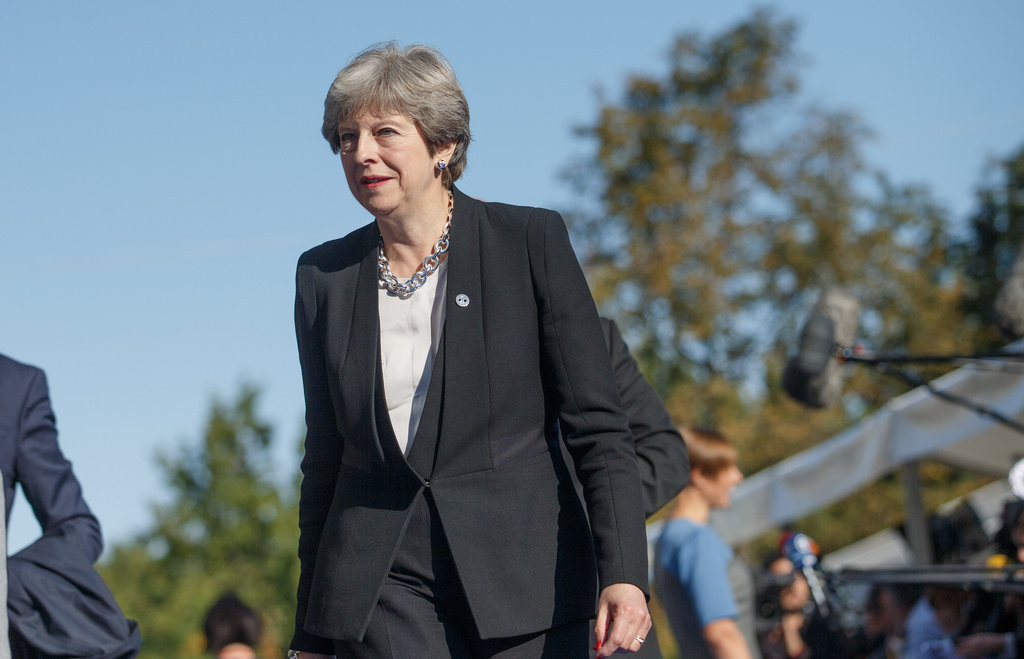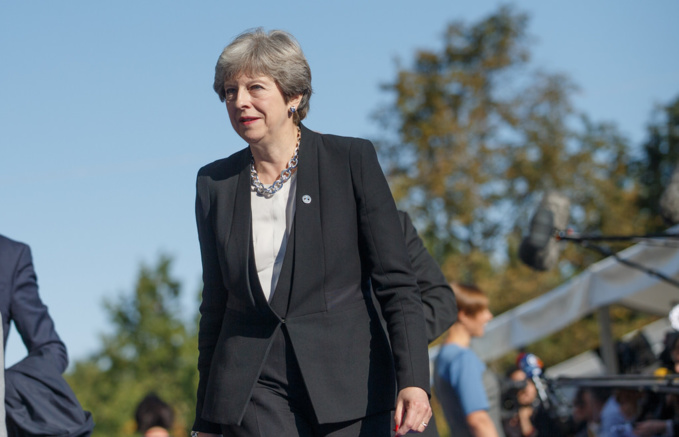Theresa May, known for her eccentric and bright outfits, appeared on the eve of the evening meeting in a restrained, almost mournful dark blue suit with the same pair of shoes in color. Deciding to leave the red carpet en route to the meeting room, she assured journalists that the Brexit negotiations were progressing. “We see that we have already managed to agree on most of the issues, and I’m sure that everyone wants to reach an agreement,” the Prime Minister reported. “I’ll talk with EU leaders about progress in Brexit. It is possible to reach an agreement, and I believe that it will be.” After a brief statement, the Prime Minister proceeded to the hall for a meeting with Presidents of the European Council and the European Commission, as well as with leaders of the remaining 27 EU countries: she had to tell her colleagues "about the successes" in the Brexit talks.
This meeting of the leaders could have been completely different - in the absence of Theresa May (European legislation doesn’t imply participation of the leaving country in such negotiations) and in the presence of the final agreement on the separation of Great Britain. However, although London officially began negotiations with Brussels last June, the agreement was not prepared by yesterday. And Theresa May was specifically invited to the meeting (but not for a working dinner) by the President of the European Council Donald Tusk. According to him, it is now "as likely as ever" that an agreement cannot be reached. Another evidence of this was the fact that the Brexit negotiations between the EU and London, which lasted until last Sunday under the leadership of Special Representatives Michel Barnier and Dominic Raab, were suspended on Monday until yesterday's meeting.
There are two main difficulties. First, the United Kingdom and its European partners cannot agree on the customs status of Northern Ireland.
In the current situation, the EU proceeds from the assumption that this part of Britain will remain in the European Customs Union, and something like customs border, the backstop, will be created between it and the rest of the kingdom. London is absolutely dissatisfied with such a scenario since the UK is afraid of renaissance of Irish separatism. As an alternative, it was proposed to create a free customs zone in Northern Ireland, which, in turn, outraged the European Union: in this case, British companies will actually receive a carte blanche to preserve advantages of the free market.
Secondly, even if Mrs. May manages to find a common language with her colleagues in Brussels, it is likely that the agreement will not be supported in her homeland.
Even in his own party, the Conservative Prime Minister has both supporters of a softer exit scenario (in order to reduce costs of a financial gap with the EU) and opponents who accuse Teresa May of indulging continental politicians. In the absence of consensus within the British political establishment itself, it is highly likely that not a single draft agreement will be approved by Parliament.
If the negotiators fail to reach a consensus by December, the European parliaments will not be able to pass the agreement on time. This means that London and Brussels will have no agreement by March 29, 2019 - the final exit date from the EU.
In this situation, an extension of the so-called transitional period could serve as a certain compromise. Recall, until now, it was assumed that the UK would formally leave the European Union in March 2019, but all the steps for the actual disengagement will be implemented gradually and as painlessly as possible by the end of December 2020. Until that time, Britain, in particular, should remain a member of the single market and the EU Customs Union. Now EU negotiator Michel Barnier proposes to extend this period by another year, until January 1, 2022. “This extension is another example of how flexible we are trying to help the British side if they want to,” the Financial Times quoted an unnamed European diplomat.
source: ft.com, theguardian.com
This meeting of the leaders could have been completely different - in the absence of Theresa May (European legislation doesn’t imply participation of the leaving country in such negotiations) and in the presence of the final agreement on the separation of Great Britain. However, although London officially began negotiations with Brussels last June, the agreement was not prepared by yesterday. And Theresa May was specifically invited to the meeting (but not for a working dinner) by the President of the European Council Donald Tusk. According to him, it is now "as likely as ever" that an agreement cannot be reached. Another evidence of this was the fact that the Brexit negotiations between the EU and London, which lasted until last Sunday under the leadership of Special Representatives Michel Barnier and Dominic Raab, were suspended on Monday until yesterday's meeting.
There are two main difficulties. First, the United Kingdom and its European partners cannot agree on the customs status of Northern Ireland.
In the current situation, the EU proceeds from the assumption that this part of Britain will remain in the European Customs Union, and something like customs border, the backstop, will be created between it and the rest of the kingdom. London is absolutely dissatisfied with such a scenario since the UK is afraid of renaissance of Irish separatism. As an alternative, it was proposed to create a free customs zone in Northern Ireland, which, in turn, outraged the European Union: in this case, British companies will actually receive a carte blanche to preserve advantages of the free market.
Secondly, even if Mrs. May manages to find a common language with her colleagues in Brussels, it is likely that the agreement will not be supported in her homeland.
Even in his own party, the Conservative Prime Minister has both supporters of a softer exit scenario (in order to reduce costs of a financial gap with the EU) and opponents who accuse Teresa May of indulging continental politicians. In the absence of consensus within the British political establishment itself, it is highly likely that not a single draft agreement will be approved by Parliament.
If the negotiators fail to reach a consensus by December, the European parliaments will not be able to pass the agreement on time. This means that London and Brussels will have no agreement by March 29, 2019 - the final exit date from the EU.
In this situation, an extension of the so-called transitional period could serve as a certain compromise. Recall, until now, it was assumed that the UK would formally leave the European Union in March 2019, but all the steps for the actual disengagement will be implemented gradually and as painlessly as possible by the end of December 2020. Until that time, Britain, in particular, should remain a member of the single market and the EU Customs Union. Now EU negotiator Michel Barnier proposes to extend this period by another year, until January 1, 2022. “This extension is another example of how flexible we are trying to help the British side if they want to,” the Financial Times quoted an unnamed European diplomat.
source: ft.com, theguardian.com



















